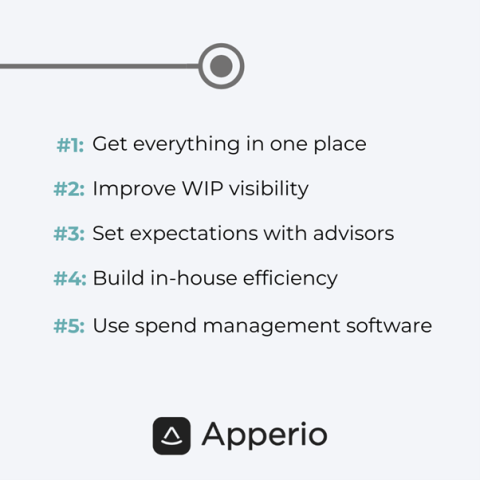Encouraging cost management confidence for in-house teams

Managing legal and tax costs is a major challenge for private equity firms looking to get the most from their investments. But getting this right relies on legal spend management that’s data-driven so that firms get the forward-looking intelligence needed for accurate decision-making.
It’s no mean feat, challenges like the lack of transparency in legal billing, and difficulties in accurately predicting future expenses—all while ensuring that the legal support received is both high quality and cost-effective.
So, the pressure is on to not only manage these costs effectively but to do so in a way that aligns with the firm's broader financial and strategic goals.
To help private equity GCs, we’ve put together the top strategies used by the leading firms. Let’s get straight to it. 👇
The essential role of enhancing fund management efficiency
Achieving top-tier investment performance is intrinsically linked to getting a handle on legal costs. Effective management requires more than just monitoring the bottom line; it requires a strategic approach to forecasting, budgeting, and negotiating legal fees. Why? Because by prioritizing efficiency, private equity firms can ensure that every pound spent on legal services directly supports their strategic objectives, enhancing their competitive edge in a crowded marketplace.
Now we’ve covered the basics, let’s look at best practices.
5 strategies for staying in control of legal fees
From leveraging technology to enhance transparency, to adopting a proactive stance on budgeting and negotiations, this section delves into how exactly firms can better manage legal costs.
#1. Get everything in one place
The first step towards controlling legal and advisory fees is to start tracking all costs in one system. This gives you the high-level view of your spend across house, deal and fund-related matters. Seeing costs together helps you understand the full value of your spend, and where you can make the biggest impact to improve value. What’s more, this big picture lets in-house counsel spot trends, budget and forecast better, and make quick decisions. And don’t forget about tax spend!
#2. Improve WIP visibility
Tracking invoices alone isn’t enough. It’s not uncommon for private equity firms to have more than 50% of their total legal spend outstanding as WIP, at any given time. This means that invoices alone are ineffective when it comes to managing budgets and understanding deal progress.
It's critical to stay on top of accruals because proactive monitoring allows in-house teams to identify potential overspends early – enabling timely interventions to prevent budget overruns and ensure financial discipline.
#3. Set expectations with your advisors
In-house teams in PE are often dealing with complex matters around acquisition and fund work.
These are typically harder to predict costs for, which makes it all the more important to have a clear expectation of the value you want to receive from your firms. Sometimes you might be happy to pay a little more for faster progress or higher quality work, but it’s important that the legal team gets to set this expectation. For example, the kind of work you want to see on a key deal might be different to the value you want to see on a more routine matter.
Setting and tracking some basic outside counsel policies is a great way to improve cost control and ensure you’re getting the value you want.
#4. Boost in-house efficiency
In-house teams typically spend significant time reporting on spend to finance, the management committee and investment teams.
Having a centralized view of spend allows you to simplify or ideally automate this reporting, freeing up valuable time and ensuring great service for key internal stakeholders.
Legal spend is more complex to track and forecast than finance teams are typically used to - that’s why it’s essential to have an experienced legal eye on the reporting.
#5. Implement legal spend management software
Investing in legal spend management software offers a technological solution to streamline the tracking, analysis, and forecasting of legal expenses.
These platforms can automate the collection and reporting of legal spend data, identify cost-saving opportunities, and ensure compliance with billing guidelines. And by providing a centralized repository for all legal spend information, these tools enable more strategic decision-making and operational efficiency.

Keen to learn more about legal spend management software? Let’s look at this in a bit more depth.
Essential features to look for in legal spend management software [Checklist]
Effective legal spend management requires more than diligence – it demands innovation. And that’s where software comes in.
There are certain key features to look for in legal spend management software that provides the control and confidence you need to build investor confidence and tick compliance requirements:
✅Centralized management platform
One single platform for costs is fundamental for legal spend control. Software offering one source of truth enables firms to maintain budget oversight and efficiently handle work in progress. Such holistic visibility is critical to prevent overspending and align fees with broader financial objectives.
✅Transparency in transactions
For mergers and acquisitions, clarity is key. Look for software providing detailed, automated breakdowns of deal costs. This allows firms to thoroughly analyze spend. Enhanced transparency empowers firms to negotiate more effectively, make informed decisions, and maximize the value of every legal expense.
✅Real-time visibility and efficiency
Efficient legal spend management depends on real-time insight. The ideal software delivers instant visibility into outsourced work, letting firms promptly address issues and avoid cost overruns. The ability to set and monitor key performance indicators for external counsel promotes efficiency and accountability, enriching the value received from providers.
✅Data-driven decision-making
Robust software should offer powerful data analytics. These features let firms understand and analyze spending patterns, identify savings opportunities, and improve forecasting accuracy. Data-driven strategic decisions enable firms to optimize legal spend and boost operational efficiency.
When selecting legal spend management software, private equity firms should prioritize features providing centralized control, transaction transparency, real-time insight, and data-driven analytics.
Did you know? Apperio is the only spend management software that allows you to track cost broken down by fund in real-time.
But don’t take our word for it. Here are just two real-life examples of how Apperio has allowed Private Equity firms to improve the transparency and efficiency of legal spend:
Legal spend management software in action
Apperio's impact on managing legal spend is clear from user experiences. Testimonials from Bill Priestley, Chief Investment Partner, and Paul Dali, Managing Director of Legal, highlight the practical benefits.
🔍Epiris
Bill Priestley points out the unmatched clarity Apperio provides: "The key point is that there is a degree of clarity when both sides can see where the time is spent more precisely… This transparency eliminates needing long requests for billing details.”
“Rather than having to say, ‘please send me reams and reams of information’, you can see it in Apperio almost immediately. And not just when the money’s already been spent".
This real-time view allows proactive management of legal costs to control spending without sacrificing legal support.
🔍EQT
Paul Dali's experience shows how Apperio improves efficiency of tracking spend: "Using Apperio to compare our spend against manual law firm reports, we could see there were gaps that couldn’t easily be explained," says Dali. This insight reveals discrepancies and inefficiencies that would otherwise go unseen."
“Apperio has also made it easier and more efficient for us to keep track of legal spend without having to ask for updates." By automating expense monitoring, Apperio helps firms like EQT manage budgets better and focus on investments.
Key takeaway? Both experiences reflect a broader trend of firms using technology for more transparency, efficiency, and control over legal costs.
Optimizing legal spend for investment success
Effectively managing legal costs is crucial for private equity firms to maximize returns. Top strategies include leveraging technology for transparency, proactive budgeting, and negotiation. Implementing software to streamline tracking, analysis, and forecasting is critical.
With the right tools and strategies focused on efficiency, transparency, and alignment, firms can better control costs and enhance their competitive edge. And Apperio provides the technology and insights for leading private equity firms.
Looking to gain control of legal spend management? See how Apperio’s platform creates one single view of legal spend. Book a live demo here.
Keen to learn more first? Read these customer stories.